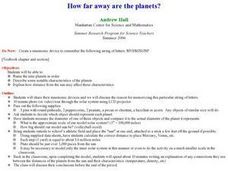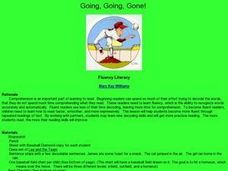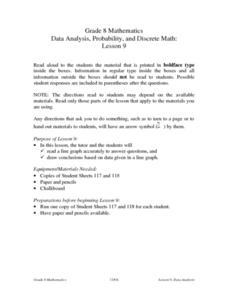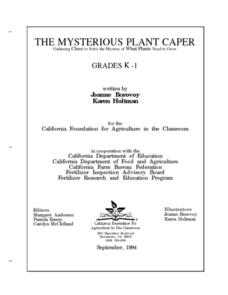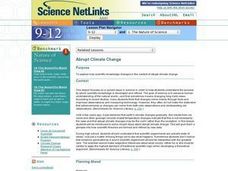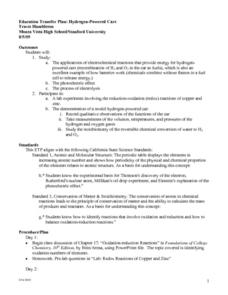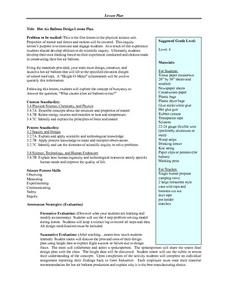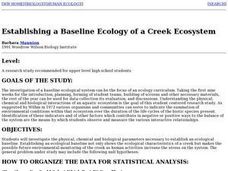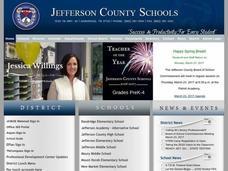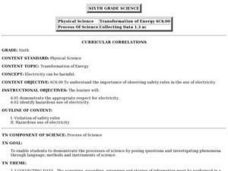Curated OER
Bog Science
Students study bogs. They tour, collect physical, chemical, and biological data and analyze a pristine bog community. Using the data, they draw a map and a cross section of the bog.
Curated OER
How Far Away Are the Planets?
Students name nine planets in order, describe some notable characteristics of the planets, explain how distance from the sun may affect these characteristics, and create solar system models.
Curated OER
Going, Going, Gone!
Sixth graders use the scientific method to test variables of evaporation. In this evaporation lesson plan, 6th graders test a wet handprint on a paper towel and relate this experiment to weather conditions.
Curated OER
Data Analysis, Probability, and Discrete Math: Line Graphs
Eighth graders analyze data from line graphs. They discuss the purpose of line graphs, identify the parts of a line graph, answer questions about various graphs, and complete a worksheet. This instructional activity includes a script...
Curated OER
Capturing the Sun's Warmth
Students explore the variety of ways to use solar energy. They investigate the thermal energy storage capacities of different test materials to determine which to use in passive solar building design. They explain how passive solar...
Curated OER
The Mysterious Plant Caper
Students investigate the basic parts of plant and that plants are living things which require water, air, light and nutrients for survival. They do this through a series of scientific experiements and multi-curricular hands-on activities.
Curated OER
Time: Attribute
Students participate in five teacher-led, whole class activities that explore sequences of time and the concept of faster and slower. They sequence school day events, create a book of their daily schedule, put the days of the week in...
Curated OER
Abrupt Climate Change
Students explore how scientific knowledge changes in the context of abrupt climate change. They are introduced to some recent ideas about abrupt climate change. This gives them a glimpse into how scientific theories are formed and...
Curated OER
Hydrogen Powered Cars
Young scholars apply the principles of chemistry to investigate the concept of how a hydrogen powered car works. They study the electrochemical reactions that provide the energy source. Students also record observations in the...
Curated OER
Hot Air Balloon Design Lesson Plan
Sixth graders discuss what they know and what they want to know about hot air balloon using a KWL chart. They then use a wide array of materials to design a hot air balloon that will lift successfully in cooperative groups referring to...
Curated OER
To Float or Not to Float, That is the Question?
Ninth graders develop operational definition of density, do computations using density equation, categorize pieces of matter as being able to float on
water or not, based on density, explain why some objects sink or float based on...
Curated OER
Establishing a Baseline Ecology of a Creek Ecosystem
Students investigate the physical, chemical and biological parameters necessary to establish an ecological baseline. Establishing an ecological baseline not only shows the ecological characteristics of a creek but makes the possible...
Curated OER
Planting Parts
Each student plants two lima beans in a plastic cup with a paper towel so they can be observed growing. The beans are misted with a spray bottle, and placed in a warm sunny area. Students view the beans each day for the next two weeks,...
Curated OER
Skeletal System
Seventh graders identify and label twenty-five bones of the skeletal system. In small groups they glue various types of dried pasta to a large human body outline. They attach the pasta to the outline and label the pasta bones.
Curated OER
Change It
Fourth graders expand their knowledge about how the physical properties of a substances can be changed. They are given multiple opportunities, using first-hand experiences and familiar objects in different contexts, to identify...
Curated OER
Electricity and Safety
Sixth graders investigate the importance of observing safety rules in the use of electricity. They discuss electricity safety rules, observe a power company employee read a meter, write and perform a commercial about electrical safety,...
Curated OER
Observing Weather
Students investigate the weather by reading children stories. In this weather observation lesson, students read Cloudy With a Chance of Meatballs and several other stories about weather before they create a KWL chart....
Curated OER
Parts of an Ecosystem
Fourth graders study the Great Salt lake and the ecosystem that encompasses it. They study the relationship between an individual of a species, a population of that species, a community that includes that population, and the...
Curated OER
What Makes a Habitable Planet?
Students list conditions necessary for humans to survive. They then mix yeast with a nutrient broth consisting of warm water and table sugar in a plastic bottle, capping it with a party balloon and compare the factors within the bottle...
Curated OER
Photosynthesis
Students investigate photosynthesis in water plants. In this photosynthesis lesson plan, students use the elodea plant and observe gas bubbles released to determine the rate of photosynthesis. They vary the light intensity and the amount...
Curated OER
Diffusion
Learners investigate diffusion using different solutions of chemicals placed in agar dishes. In this diffusion lesson plan, students observe 3 demonstrations of diffusion using perfume, food coloring in water and sugar cubes in water....
Curated OER
Indoor Gardening
Young scholars determine how a plant grows best. For this botany lesson, students observe variables that affect plant growth. Young scholars explore how to grow and maintain a plant. Students make observations of their plant as it grows.
Curated OER
Sewer Lice
High schoolers observe demonstrations that show adhesion, cohesion, equilibrium density, pressure of gases and solubility. In this gases lesson plan, students observe a demonstration of raisins, spaghetti, and popcorn moving up and down...
Curated OER
Healthy Water!?
Middle schoolers test water for its quality and record their information.In this water quality lesson, students investigate water for pH, macro invertebrates and identify its characteristics. Middle schoolers complete worksheets on their...
Other popular searches
- Measuring Temperature Math
- Measuring Temperature Lab
- Measuring Temperature Change
- About Measuring Temperature
- Winter Measuring Temperature

